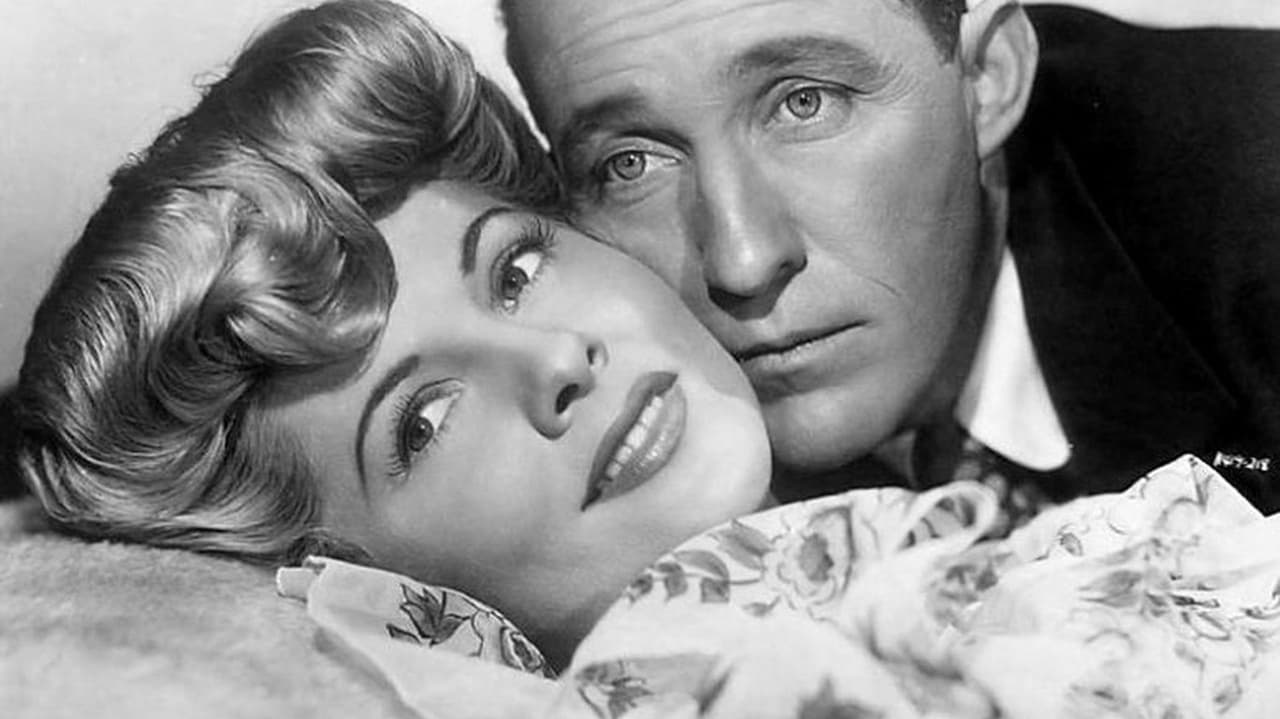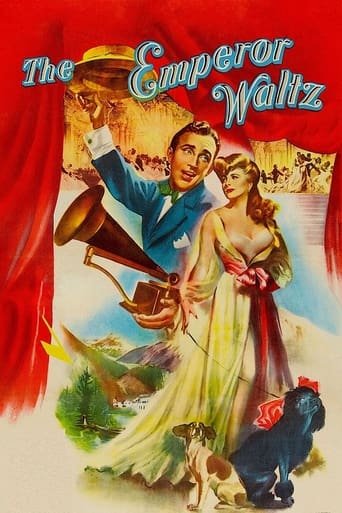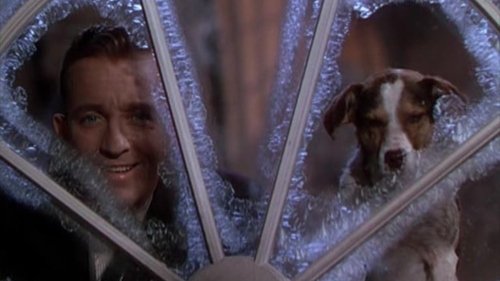


THE EMPEROR WALTZ (Paramount, 1948), directed by Billy Wilder, stars the unlikely pair of Academy Award winners, Bing Crosby (Best Actor of GOING MY WAY (1944) and Joan Fontaine (Best Actress of SUSPICION (1941) for the only time. With the title lifted from the famous Johann Strauss composition, the script, as written by Billy Wilder and Charles Brackett, has its very own direction with a story about an unlikely pairing of a traveling salesman and an aristocratic countess, a sort of theme commonly found in the Depression era 1930s made famous by director, Ernst Lubitsch with such titles as THE LOVE PARADE (1929) starring Maurice Chevalier and Jeanette MacDonald as a commoner who marries a queen . Even with such an old-fashioned tale carried on into post World War II, THE EMPEROR WALTZ no doubt worked wonders with audiences in 1948, but has become somewhat underrated today.Opening title: "On a December night some forty-odd years ago, His Majesty, Francis Joseph, the first emperor of Austria, apostolic King of Hungary, King of Bohemia, Dalmatia, Croatia, Slavonia, Galicia and so forth and so forth, was giving a little clambake at his palace in Vienna." Enter Virgil Smith (Bing Crosby), a traveling American salesman, walking through the snow, climbing the vine to the second floor terrace and into the palace of a social ball given by the Emperor Franz Joseph (Richard Haydn). Attracting attention to himself, he heads over towards the Countess Johanna Franziska Von Stultzenberg Stultzenberg (Joan Fontaine) on the dance floor demanding to speak with her. She angrily replies: "Go away. I hate you I loathe you I despise you!" At a distance, this union is observed by the middle- aged Princess Bitotska (Lucile Watson), who soon narrates the story to the guests seated around her. The flashback scenario tells of how the two met and what soon occurred to develop into a four month courtship: Virgil, a super salesman from Newark, New Jersey, comes to the Emperor's palace with his dog, Buttons, and a black box consisting of a phonograph recording machine to show the Emperor to introduce to the lives of the people of his country. Also awaiting to see the Emperor are Countess Johanna and her father, Baron Holenia (Roland Culver), a general, the matching of their black poodle with his very own dog in order to produce puppies for the lonely Emperor. After a rough start where Virgil's black box is mistaken for a time bomb, Buttons starts a battle with Johanna's dog. At first the snobbish Johanna of Stultzenberg Stultzenberg Palace on Stultzenberg Stultzenberg Square, wants nothing to do with Virgil nor his animal, but after a visit to Doctor Zwiegback (Sig Rumann), a dog psychiatrist, suggesting that both dogs should get together, not only does love eventually blossoms for both dogs, but for the salesman and the countess as well, until something occurs to cause Johanna to hate Virgil. As the princess finishes her story, more unexpected events occur. Other members of the cast consist of Julia Dean (Archduchess Stephanie); Harold Vermilyea (Chamberlain); and Doris Dowling (The Tyrolean Girl).Filmed in glorious Technicolor, much of the premise is a reminder of those Ernst Lubitch musicals for Paramount which would make one feel that had THE EMPEROR WALTZ been produced around 1932, naturally the envisioned casting might have been altered to Maurice Chevalier (the salesman), Jeanette MacDonald (the countess) and C. Aubrey Smith(The Emperor). Yet something like Rouben Mamoulian's LOVE ME TONIGHT (1932) that featured the trio in that very same musical may have some connection involving a tailor and a princess with an assortment of very fine songs. For THE EMPEROR WALTZ, with Crosby doing a Chevalier trademark by wearing a straw hat, there's limitations to song interludes, something quite unusual for a Bing Crosby movie. Songs include: "Friendly Mountains" (by Johnny Burke); "I Kiss Your Hand, Madame" (sung by Crosby, and danced by chauffeur (Bert Prival) and two barmaids); "I Kiss You Hand, Madame" (reprise); "The Kiss in Your Eyes" and finally Johann Strauss' "The Emperor Waltz" sung by Crosby with new lyrics by Johnny Burke. As beautiful as any Strauss melody can be, the major disappointment is not having "The Emperor Waltz" presented as a major dance sequence participated by cast members in song and dance rather than in brief as presented in the final print.With Joan Fontaine donning period costumes and headdress from early twentieth century, though in her early thirties, appears ten years older, with the exception of one scene where she discovers she's in love through the glitter of her eyes where she appears to look quite youthful. Character actor, Richard Haydn, unrecognizable under white mustache, beard and heavy eye lashes, is satisfactory as the emperor. At 106 minutes, an enjoyable lavish production.Formerly shown on commercial television before shifting to cable such as American Movie Classics (1995-1999), and Turner Classic Movies (TCM premiere: March 1, 2011); THE EMPEROR WALTZ has become available on both home video and later DVD (with Crosby's A CONNECTICUT YANKEE IN KING ARTHUR'S COURT (1949) on the flip side for anyone's viewing pleasure of a movie set in merry old Vienna. (***)
... View MoreIt's nice to see others who are also quite fond of The Emperor Waltz. The film mayn't be a personal favourite or a masterpiece, and there has been better from all involved- for example it is one of Billy Wilder's weakest films that I've seen but that is not knocking it at all, just that his best films are some of the best ever made- but The Emperor Waltz is still a lovely and very enjoyable film. Yes the story is incredibly silly and at its worst disposable and Bing Crosby has moments where he does overact. The Emperor Waltz does look absolutely gorgeous, the clothes and scenery coupled with the colourful cinematography really do make for a visual feast. The music is both lush and characterful, and there are songs also that are really catchy and pleasant to listen to. The choreography in the ballet sequence is wonderfully nimble as well as deliciously witty, it also doesn't go on for too long or bog the film down. The script at its best is uproariously funny with Wilder's style definitely coming through, helped by the great comic delivery, and there is also room for some genuinely sweet moments without falling into schmaltz as well as some biting but often gentle cynicism with the portrayal of the Austrian court while keeping in good taste still. Wilder directs with a sure hand, if not at his best and in the performances there is little to complain about. Particularly good are the dog Buttons, who bags some of the film's funniest moments as well as its sweetest, and an unrecognisable Richard Haydn, sometimes his character is irritating but Haydn is also hilarious and thoughtful too. Joan Fontaine is subtle and touching, the rest of the supporting cast turn in good work and while Crosby does go overboard at times he takes a light-hearted and suave approach in others which is most endearing and he characteristically sings magnificently. Overall, lovely stuff with a lot to like. 8/10 Bethany Cox
... View MoreTHE EMPEROR WALTZ can be best viewed today as director Billy Wilder's attempt to explain why such a schnitzel-loving country as Austria could be drafted onto the losing side of not one but TWO world wars against the Allies last century.This story begins with an American salesman (Bing Crosby) going over to a backward European country which has barely heard of electricity and light bulbs, even though they'd been around more than three decades at the time this docudrama takes place. (Everyone knows that even Pitcairn's Island will get its first shipment of iPad 2's before they've been out a week.) To add insult to injury, when the salesman is savvy enough of local mores to offer his prototype iPod to the local honcho, this emperor's backward thugs throw the entertainment device into a goldfish pond, proclaiming it a weapon of mass destruction. This is clearly Wilder's allegorical riff on the tragic events kicking off WWI.The rest of the movie is about dog breeding, an obvious allusion to the Aryan eugenics mania practiced by Hitler and his Austrian cronies up to and during WWII. Is the Austrian working class (well represented in this movie by chauffeurs, maids, teamsters, hunting guides, cops, etc.) protesting in the streets over all these evil shenanigans? Heck no! Wilder shows us. They just gallivant about without a care in the world, dancing and yodeling for no reason, oblivious to the grim fate in store for them. Clearly, THE EMPEROR WALTZ was the major influence inspiring Mel Brooks to write "Springtime for Hitler" into his blockbuster, THE PRODUCERS.
... View MoreWhat a nice delightful film this turned out to be. I'm in my musical phase of movies, and while this really cannot be classified as a true "musical", it does have a couple on nice songs and a short dance sequence. I guess you could classify this as a "quasi-musical". Anyway, the story is fun with the typical Billy Wilder political overtones that do not detract from the plot line. The scenery is great, as is Bing Crosby and Richard Haydin. Joan Fontaine is fine in what is asked of her. The real stars are the two dogs. Their scenes are delightful, as is the film. While there is a tad of dramatics at the end, it all turns out fine as expected. Would have like to have the fade-out of the two dogs cuddling up. See this one for a royal treat.
... View More